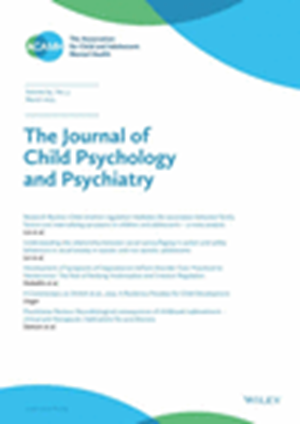Childhood Mild Traumatic Brain Injury is Reliably Associated with Anxiety but Not Other Examined Psychiatric Outcomes at Two‐Year Follow‐up, After Adjusting for Prior Mental Health
IF 6.5
1区 医学
Q1 PSYCHIATRY
引用次数: 0
Abstract
BackgroundEvidence that mild traumatic brain injury (mTBI) causes psychiatric problems in children has been mixed. Investigating this issue has been difficult due to the lack of representative longitudinal data that includes adequate measures of mTBI, subsequent mental health symptoms and service use.MethodsWe used data from the ABCD longitudinal cohort study to examine the association between mTBI and psychiatric diagnoses, symptoms and psychiatric service use in over 11,000 children. In both children reporting (i) previous mTBI at baseline and (ii) previously uninjured children reporting new cases of mTBI since baseline, we examined psychiatric outcomes and service use at 2‐year follow‐up. We also compared mTBI cases to a comparison group of participants with orthopaedic injury but without mTBI. Mixed‐effects models were used and adjusted for demographic and social covariates, with missing data imputed using random forest multiple imputation. To account for baseline mental health, we used propensity‐score matching to identify a comparison sample matched on confounding variables and baseline outcome measures.ResultsWhen examined without adjustment for baseline mental health, both lifetime mTBI at baseline and new occurrence of mTBI at 2‐year follow‐up were reliably associated with an increased risk of DSM‐5 anxiety and behavioural disorders, a range of psychiatric symptom scores and increased service use. Controlling for baseline mental health in the mTBI group using propensity‐score matching eliminated all statistically reliable associations apart from anxiety disorder diagnosis and symptoms, which remain associated at 2‐year follow‐up. Evidence for association with medication use was inconsistent.ConclusionsConsistent evidence supporting an association between paediatric mTBI and subsequent anxiety was found; however, similar associations were not observed for other mental health outcomes. Regardless of potential causality, children with mTBI are likely to present with high levels of mental health difficulties, and this remains an important comorbidity that clinicians should be aware of.儿童轻度外伤性脑损伤与焦虑可靠相关,但在调整之前的心理健康后的两年随访中,与其他检查的精神病学结果无关
背景:轻度创伤性脑损伤(mTBI)引起儿童精神问题的证据不一。调查这一问题一直很困难,因为缺乏具有代表性的纵向数据,包括对中度脑损伤、随后的精神健康症状和服务使用情况的适当测量。方法:我们使用ABCD纵向队列研究的数据,对11,000多名儿童进行mTBI与精神科诊断、症状和精神科服务使用之间的关联研究。在报告(1)基线时既往mTBI的儿童和(2)基线后未受伤的报告新mTBI病例的儿童中,我们在2年随访中检查了精神病学结果和服务使用情况。我们还将mTBI病例与有骨科损伤但没有mTBI的对照组进行了比较。使用混合效应模型,并对人口统计学和社会协变量进行了调整,缺失数据采用随机森林多重插值法输入。为了解释基线心理健康状况,我们使用倾向得分匹配来确定与混杂变量和基线结果测量相匹配的比较样本。结果在不调整基线心理健康的情况下进行检查时,基线时的终身mTBI和2年随访时mTBI的新发均与DSM - 5焦虑和行为障碍风险增加、一系列精神症状评分和服务使用增加可靠相关。使用倾向评分匹配控制mTBI组的基线心理健康消除了除焦虑障碍诊断和症状外的所有统计可靠的关联,这些关联在2年随访中仍然存在。与药物使用相关的证据并不一致。结论:有一致的证据支持儿童mTBI与随后的焦虑之间的关联;然而,在其他心理健康结果中没有观察到类似的关联。无论潜在的因果关系如何,患有mTBI的儿童很可能表现出高度的精神健康困难,这仍然是临床医生应该意识到的一个重要的合并症。
本文章由计算机程序翻译,如有差异,请以英文原文为准。
求助全文
约1分钟内获得全文
求助全文
来源期刊
CiteScore
13.80
自引率
5.30%
发文量
169
审稿时长
1 months
期刊介绍:
The Journal of Child Psychology and Psychiatry (JCPP) is a highly regarded international publication that focuses on the fields of child and adolescent psychology and psychiatry. It is recognized for publishing top-tier, clinically relevant research across various disciplines related to these areas. JCPP has a broad global readership and covers a diverse range of topics, including:
Epidemiology: Studies on the prevalence and distribution of mental health issues in children and adolescents.
Diagnosis: Research on the identification and classification of childhood disorders.
Treatments: Psychotherapeutic and psychopharmacological interventions for child and adolescent mental health.
Behavior and Cognition: Studies on the behavioral and cognitive aspects of childhood disorders.
Neuroscience and Neurobiology: Research on the neural and biological underpinnings of child mental health.
Genetics: Genetic factors contributing to the development of childhood disorders.
JCPP serves as a platform for integrating empirical research, clinical studies, and high-quality reviews from diverse perspectives, theoretical viewpoints, and disciplines. This interdisciplinary approach is a key feature of the journal, as it fosters a comprehensive understanding of child and adolescent mental health.
The Journal of Child Psychology and Psychiatry is published 12 times a year and is affiliated with the Association for Child and Adolescent Mental Health (ACAMH), which supports the journal's mission to advance knowledge and practice in the field of child and adolescent mental health.

 求助内容:
求助内容: 应助结果提醒方式:
应助结果提醒方式:


